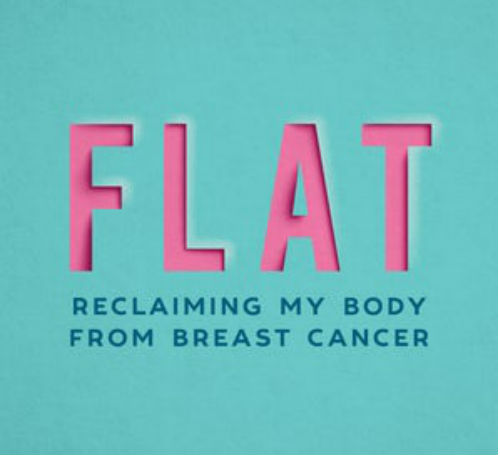‘Flat: Reclaiming My Body from Breast Cancer’ by Catherine Guthrie

Author: Sandra Lambert
January 23, 2019
“Some of my straight friends assumed going flat was an easier choice for me because of my queerness…. But what they couldn’t know was that my breasts were a part of my queer-femme identity. There was nothing easy about it.”
Catherine Guthrie was thirty-eight when she was first diagnosed with breast cancer. But this isn’t only a story of diagnosis, treatment, medical mistakes, and complications told within the impossibility of a neat or final resolution. It is also the complex, honest, and tender rendering of how breast cancer changes her understanding of her own body, her relationship with her beloved Mary, and even the style and content of what she is able to write in her career as a women’s health journalist.
Until she became immersed in the San Francisco queer grrl culture of the 90s, Guthrie “had a polite, long distance relationship” with her body. “It was down there, but we didn’t talk much.” But in the steamy, naked atmosphere of a Valencia bathhouse, women “modeled a sense of unapologetic comfort in their bodies regardless of color, shape, or size” and provided Guthrie with “a comfort and ease that came with knowing who I was in this body of mine.”
Cancer, or more accurately the treatment for cancer, takes that ease away. She decides on a double mastectomy with no reconstruction, she has radiation and later chemo, and she is on hormone suppressing drugs. Her public appearance is altered. And her private moments are reshaped: “In abundance of breasts is one of the best things about sleeping with women,” she writes. The burns of radiation, the joint pain and mood alterations of hormone therapy, and the debilitation of chemo treatments also alter desire. But one evening, as she is once again turning her body away from Mary as she undresses, Mary says that she doesn’t care about Guthrie’s scars or that she doesn’t have breasts. What she misses is “that confidence you had in your body, the ease you felt…that’s what I fell in love with…I never thought you’d lose that.”
With clarity, specificity, and keen narrative skills, Guthrie tells the story of how she regains that sense of ease in her body and finds joy once again in her relationships with her beloved, her career, and her community of friends. Guthrie takes what could have been a weight of information and statistics and embeds them in compelling scenes of both despair and healing. Her writing voice has a comforting authority that allows the reader to stay present as she recounts days of ugly depression or the horror of medical errors. The way her writing balances self-revelation and discretion infuses a deep caring into her work even or especially when describing the inadvertent unkindnesses that both she and Mary visit on each other in the exhaustion of feelings that comes with illness. Details and moments—doing her first yoga headstand after surgery, developing a new sense of fashion, obsessively moving furniture—manage to illustrate and enhance the larger themes that all of us with breast cancer are familiar with.
We have to navigate a morass of medical decisions and procedures. Many of us are repulsed by how women’s magazines present a falsely chipper view of breast cancer. Guthrie used to write for these magazines and now finds that she no longer can, even at the possible expense of her career. Those of us who reject the “pink ribbon bullshit,” like Guthrie, have also had to temper our scorn as we accept the fact that those who do find comfort in all things pink are now our people as well and have much to offer.
Here is a recounting of one woman’s experience told in a way that embraces so many of us, not just other people with breast cancer, but anyone confronted with both the loss and liberation that can be brought on by a changed body. This is Guthrie’s journey from being “a stranger in my body and unrecognizable in my relationship with Mary” to having a heart “full and light,” and realizing that “on the inside my body’s strength, power, and integration was a thing of beauty.”
Flat: Reclaiming My Body From Breast Cancer
By Catherine Guthrie
Skyhorse Publishing
Hardcover, 9781510732919, 264 pp.
September 2018

